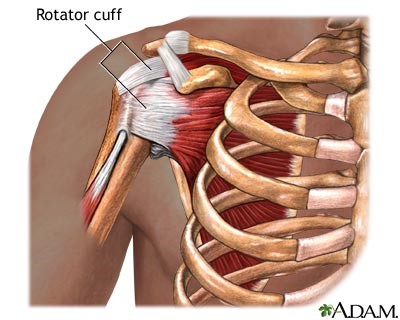Rotator Cuff Pain
Jump to:
Shoulder pain
What causes the shoulder pain?
• Pain while sleeping at night.
• Less motion in the shoulder.
• Pain with resisted motion like pushing or pulling.
• Decrease activities that use the arm and shoulder.
• Icing. Use a bag of crushed ice, or frozen peas or corn. You can reuse these items as an ice pack. Do not eat the corn or peas once they have been used as an ice pack.
- Put a towel between skin and bag. If you put the ice pack directly on the skin, it may cause frost bite. Put the bag on the sore area.
- Leave on for 15 to 20 minutes.
• Range of motion and shoulder strengthening exercises may start with the help of a physical therapist. These will also need to be done at home. Regular therapy helps you learn an exercise routine. This will help you get back to regular activities.
What causes the shoulder pain?
The rotator cuff is a group of muscles around the shoulder. It helps keep the arm bone (humerus) in the joint. Shoulder pain can happen when:
• The rotator cuff or the bursae sacs in the shoulder are pinched between two bones.
• When muscles are overused.
• When overstretched by being placed in improper positions.
The pinching can cause extreme pain when the arm is moved overhead. It may be caused by:
• Poor posture. When the shoulders are forward or rounded.
•Poor muscles around the shoulder blade leading it to not working as it should.
• Muscle imbalance due to muscles and tendons in the shoulder.
• Overhead activity or sport.
• Increased shoulder motion. This causes the humerus bone to not stay in the joint as it should.
What are the symptoms?
• Pain in the shoulder or outside of the upper arm when lifting over head.• Pain while sleeping at night.
• Less motion in the shoulder.
• Pain with resisted motion like pushing or pulling.
How is it diagnosed?
Your healthcare provider will review your activities. It is diagnosed by the location of the pain, symptoms and a physical exam. If therapy and rest do not decrease the pain, an MRI may be needed.How is it treated?
Pain medicine, decreased activity, resting and icing the shoulder may help with pain and swelling. Other treatments may include:• Decrease activities that use the arm and shoulder.
• Icing. Use a bag of crushed ice, or frozen peas or corn. You can reuse these items as an ice pack. Do not eat the corn or peas once they have been used as an ice pack.
- Put a towel between skin and bag. If you put the ice pack directly on the skin, it may cause frost bite. Put the bag on the sore area.
- Leave on for 15 to 20 minutes.
• Range of motion and shoulder strengthening exercises may start with the help of a physical therapist. These will also need to be done at home. Regular therapy helps you learn an exercise routine. This will help you get back to regular activities.



